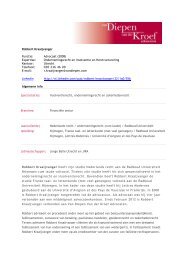Writ of summons - Van Diepen Van der Kroef
Writ of summons - Van Diepen Van der Kroef
Writ of summons - Van Diepen Van der Kroef
Create successful ePaper yourself
Turn your PDF publications into a flip-book with our unique Google optimized e-Paper software.
‘The United Nations shall make provisions for appropriate modes <strong>of</strong> settlement <strong>of</strong>:(a) disputes arising out <strong>of</strong> contracts or other disputes <strong>of</strong> a private law character towhich the United Nations is a party;’Despite the fact that this provision originated in 1946, the UN has still at present – morethan sixty years later – never established an agency for dispute settlement where Plaintiffcould institute her claim. Apart from that, Section 29 <strong>of</strong> the Convention contemplateddisputes arising un<strong>der</strong> the civil law and expressly not any claim un<strong>der</strong> publicinternational law.458. Plaintiff notes that the State <strong>of</strong> the Netherlands is a Contracting State to the EECHR andto the ICCPR, and has ratified these conventions. Consequently, the Dutch Court canaccord no immunity to the UN because to do so would violate the fundamental right <strong>of</strong>Plaintiff and the persons whose interests are promoted by Foundation.459. A. Reinisch also confirms that Belgium, as a party to the EECHR, should have <strong>of</strong>feredMan<strong>der</strong>lier access to the Tribunal through the national court system and should not haveupheld the claim to immunity (A. Reinisch, International Organizations before NationalCourts, 2000, page 289).460. K. Wellens has expressed that same opinion in his publication, ‘Fragmentation <strong>of</strong>international law and establishing an accountability regime for internationalorganisations: The role <strong>of</strong> the judiciary in closing the gap’ (see, Michigan Journal <strong>of</strong>International Law, 11 May 2004). Wellens states, with reference also to Ch. Dominicé,that the right <strong>of</strong> access to the court should weigh more heavily than the interest <strong>of</strong>immunity (K. Wellens, op. cit., page 18):‘(…) access should prevail over immunity if no legal remedy is available.’461. The Advisory Commission on Issues arising un<strong>der</strong> Public International Law (CAVV)referred to above, which advises the Netherlands Government on issues <strong>of</strong> internationallaw, shares the above view that, in the absence <strong>of</strong> any other legal remedy, the right <strong>of</strong>© <strong>Van</strong> <strong>Diepen</strong> <strong>Van</strong> <strong>der</strong> <strong>Kroef</strong> Advocaten 2007www.vandiepen.com191
















